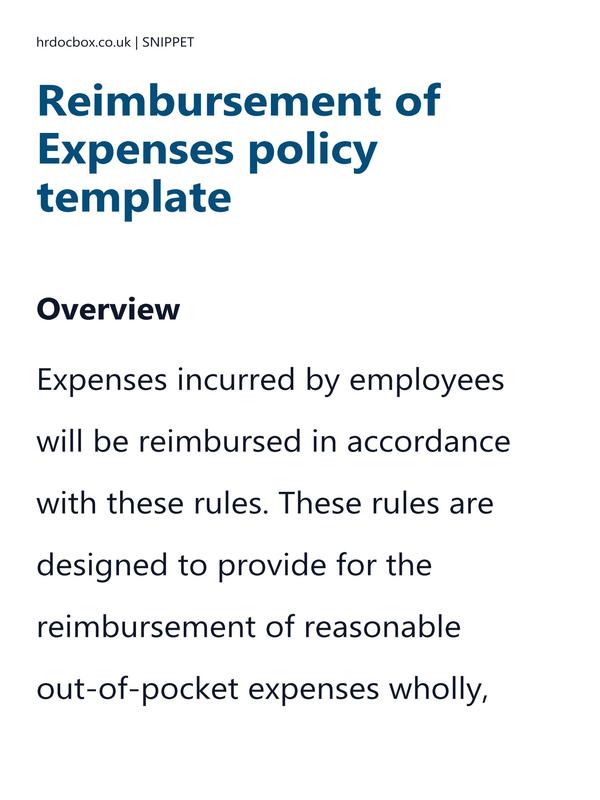Reimbursement of Expenses policy template


Our Reimbursement of Expenses Policy Template outlines guidelines for employees to claim expenses, ensuring transparency and compliance with company reimbursement procedures.
- Includes 12 months' access to the Reimbursement of Expenses policy template, with all updates provided free of charge and notified to you.
- UK-specific accuracy.
- 574 words over 2 pages.
- Last updated 07/02/2025.
- Format: Word / plain text / email.
- Delivery: Instant download after purchase (no physical item).
- Access: Download link shown here after checkout.
- This Reimbursement of Expenses policy template will SAVE you up to 1 hour 30 mins drafting & research, save you money, and reduce your risk.
Reimbursement of Expenses policy
1 Overview
1.1 Expenses incurred by employees will be reimbursed in accordance with these rules. These rules are designed to provide for the reimbursement of reasonable out-of-pocket expenses wholly, exclusively, necessarily and actually incurred by an employee engaged on the business of the Company.
2 Scope
2.1 This policy is applicable to all employees of [company name].
3 General principles
3.1 Claims
3.1.1 In order to claim back expenses, you must complete and sign a claim form, have it countersigned by your line manager and then submit it to [insert name of contact].
3.1.2 You are expected to provide original VAT receipts for expenditure incurred where this is reasonably practicable and you should give a full description of the expenditure incurred and why it was necessary.
3.1.3 You should ensure all expense claims are made and submitted promptly.
3.1.4 The Company does not advance expenses.
3.2 Travelling expenses
The Company will reimburse travelling expenses necessarily incurred for business purposes. This is generally limited to the cost of travel from the Company's office to the business destination and return. Journeys between an employee's home and normal place
This is a 30% preview of the Reimbursement of Expenses policy template. For instant full access, purchase this item or a parent bundle.
Reimbursement of Expenses policy template purpose
A reimbursement of expenses policy is a set of guidelines and procedures that define how an employee can be reimbursed for any expenses incurred during the course of their work. Such expenses could include travel expenses, meals, lodging, equipment or materials, or other related costs. The policy outlines what expenses are eligible for reimbursement and how they will be reimbursed.
Having a clear reimbursement of expenses policy can help ensure that employees are properly reimbursed for expenses incurred while conducting company business. It can also help prevent misunderstandings or disputes between employees and employers regarding what expenses are eligible for reimbursement and how reimbursement will be handled.
Practical application of a Reimbursement of Expenses policy template
- Issue the Reimbursement of Expenses policy template during onboarding / after changes / planned refresher.
- Send it to appropriate internal recipients such as employees, workers, contractors etc. and request confirmation that is has been read and understood.
Compliance
Compliance
This Reimbursement of Expenses policy template incorporates relevant UK laws and HR standards, including those listed below:
Here are some key UK employment law considerations to keep in mind when implementing expenses policies:
-
Compliance with tax law: The policy must comply with HMRC rules, which outline what expenses can be reimbursed tax-free, and which require tax to be deducted from certain payments.
-
Reasonable and necessary expenses: Employers are only required to reimburse expenses that are reasonable and necessary for the employee to do their job. This means that expenses must be directly related to work duties, and not personal expenses.
-
Discrimination: The policy must not discriminate against any employees on the basis of protected characteristics, such as age, race, gender, or disability.
-
Health and Safety: Employers must ensure that expenses policies do not require employees to carry out work activities that are unsafe or put their health at risk.
-
Data Protection: Employers must ensure that any personal data collected as part of expenses policies is handled in compliance with the General Data Protection Regulation (GDPR) and the Data Protection Act 2018.
-
Employee Communication: Employers must ensure that the expenses policy is clearly communicated to all employees, and that employees understand the policy requirements, including how to claim expenses and what receipts and documentation are required.
-
Grievances and complaints: Employers must have a system in place for employees to raise concerns or complaints about the expenses policy, and for these to be investigated and resolved fairly.
-
Contractual entitlements: Employers must ensure that the policy is consistent with the terms of the employment contract and any relevant collective agreements.
Frequently Asked Questions about a Reimbursement of Expenses policy template
Frequently Asked Questions about a Reimbursement of Expenses policy template
-
Can I use the Reimbursement of Expenses policy template in my small business?
Yes. The Reimbursement of Expenses policy template is designed to be flexible and suitable for organisations of all sizes, including small businesses and charities. It follows UK employment law best practice, so even if you don't have an in-house HR team, you can confidently apply it.
-
Is the Reimbursement of Expenses policy template compliant with 2026 UK employment law?
Absolutely. Like the Reimbursement of Expenses policy template, all of our templates are drafted with the latest ACAS guidance and UK employment legislation in mind. We review and update them regularly, so you can be confident they remain compliant.
-
Can I customise the Reimbursement of Expenses policy template for my organisation?
Yes, we highlight the areas of the Reimbursement of Expenses policy template that you need to update with your own details, and where you need to make decisions to suit your situation. This saves you time and ensures that you meet best practice.
-
Do I get instant access to the Reimbursement of Expenses policy template?
Yes. Once purchased, you'll be able to download the Reimbursement of Expenses policy template instantly. Templates are provided in editable Word or Excel format so you can customise them easily, and in PDF format for easy sharing.
-
What if I need more help, not just a Reimbursement of Expenses policy template?
If you're looking for broader support, we also offer toolkits and library bundles that include the Reimbursement of Expenses policy template, along with other HR templates and policies for fully managing your situation. These may be more cost-effective if you need deeper advice.
-
Why should I use this Reimbursement of Expenses policy template, and not AI to generate it?
The risk of using a free AI-generated template 'without review' includes your legal exposure, missing context, and no awareness of the wider process, whereas purchasing the Reimbursement of Expenses policy template from us mitigates that risk.
